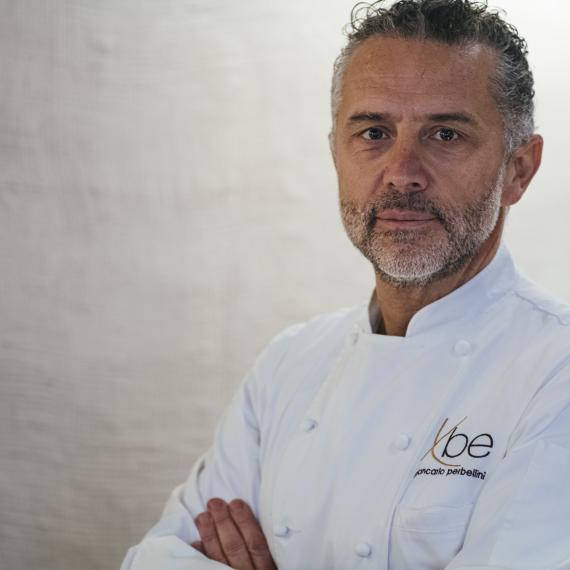Giancarlo Perbellini

Bourgeois (in fact Bergese) yet casual: this is the format chosen by Giancarlo Perbellini for his restaurant, opened in December 2014 right in the centre of Verona, next to the Romanic basilica of San Zeno. Waiters in jeans and gym shoes, chefs wearing a waistcoat and a cap instead of the toque (as was once customary), a kitchen cloth hanging from the waist, like his grandfather, the founder of the dynasty. In the background there’s a kitchen that is more than open view, it is indeed within reach, just barely hidden by a powerful vacuum system: which is also homely, in shape and colours. It is one step under the dining room, like the mystic gulf recalling Wagner, where the tireless ubiquitous chef calls dishes, checks the pass, cooks and finishes.
The atmosphere is much different from the rather formal solemnity of Isola Rizza, a great restaurant with all the proper customary character. However, it has an equally pure pedigree: here the dream of Nino Bergese is revived, that of a bourgeois that is to say homely cuisine turned into a restaurant offer. Although the hearth does not belong to some rich industrialist, but to all of us, invited at Casa Perbellini in our everyday clothes. Still, the cuisine has not wandered off: beside the heritage of San Domenico, it collects that of Angelo Paracucchi, who was the first to analyse codes and techniques in Italian cuisine, starting from the totem of first courses, and of Bernard Pacaud, by whose side he worked at Ambroisie.
Indeed, as in Place des Vosges, the line is prepared day by day, with the only exception of the demi-glace. There’s no space (not even a physical one) for refrigerating rooms, replaced by daily supplies. And vacuum is also prepared on spot, used rarely and shortly during the service. These are the traits of a multi-classic style, in terms of elegance, sources, perfection. A hybrid in an Italian and contemporary way, following that porosity that according to Salvatore Settis represents “a characteristic essential trait of ‘classic’” in its most faithful interpretation.
Has participated in
Identità Milano
Umbra di Perugia con residenza a Bologna, è giornalista e scrittrice di cucina. Tra i numeri volumi tradotti e curati, spicca "6, autoritratto della Cucina Italiana d’Avanguardia" per Cucina & Vini